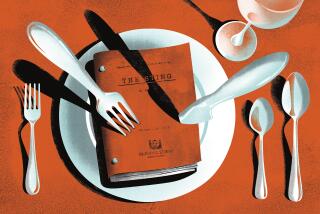Caroline Knapp, 42; Wrote of Alcohol Struggle
- Share via
Caroline Knapp, a journalist and author who detailed her struggle with alcoholism with candor and eloquence in the bestselling memoir, “Drinking: A Love Story,” has died. She was 42.
Knapp died June 3 at Mount Auburn Hospital in Cambridge, Mass. The cause of death was complications from lung cancer.
A slight book and one of relatively few in the literature of alcoholism written from a woman’s point of view, “Drinking” was a bestseller when it was released in 1996 and earned generally positive reviews. Knapp became a familiar figure on talk shows, including “CBS This Morning” and “Oprah,” and was profiled in People magazine and the New York Times.
Knapp was raised in Cambridge. Her father was a prominent psychiatrist and professor at Boston University. Her mother was an artist.
High-strung and with behavior patterns that would later be seen as obsessive, Knapp was a bright student who attended an exclusive prep school. She later graduated with honors from Brown.
She became a respected journalist, working first at the Boston Business Journal and then the Boston Phoenix, an alternative newspaper, where she was a writer and editor.
At the Phoenix she wrote a column called “Out There” about a semi-fictional professional woman in her early 30s named Alice K., which Knapp noted dryly was not her real middle initial.
Her first book, “Alice K.’s Guide to Life: One Woman’s Quest for Survival, Sanity and the Perfect New Shoes,” was a collection of her Alice K. columns.
She explored the boundaries of love in the book “Pack of Two: The Intricate Bond Between People and Dogs,” which detailed her relationship with her dog Lucille.
But “Drinking: a Love Story” was her most influential book. It chronicled a life that to most outward appearances seemed orderly and highly successful. “High functioning” is what she termed it.
Knapp recalled that she had her first drink at age 12 or 13 and was getting drunk periodically by her sophomore year in high school. She was 16 when she got drunk in secret for the first time after a troubling phone conversation with a boy she thought was going to break up with her. She started a habit that was to steadily worsen over the next 20 years.
She was, she wrote, “smooth and ordered on the outside; roiling and chaotic and desperately secretive underneath, but not noticeably so, never noticeably so.”
And that desperate secretiveness was begging for some relief. She found it in the bottle.
“Drinking had a lubricating effect that altered the dynamic,” Knapp said in an interview some years ago. “It turned me into the person I thought I was supposed to be: more confident, less shy, prettier.”
She also wrote candidly of her difficult relationships with men and how alcohol contributed to the problem.
“Alcohol felt like the cement in female sexuality, at least it did to me: Over the years the two would become so deeply linked that for the longest time I simply couldn’t imagine one without the other. A first kiss without drinks? Forget it. Sex without liquor? No way. Drinking was as integral to my sense of sexuality as a body part: no more, no less.”
But as her drinking progressed, her ability to manage it declined. And although she never lost a job or went to jail because of her drinking, she was caught in the downward spiral that most alcoholics face.
As she told it, her moment of truth came after a drunken incident involving the young daughters of a friend on Thanksgiving weekend in 1993. After hoisting the older of the two girls onto her back and bidding the youngest to hang onto her neck, Knapp started running uncontrollably across the street and fell, lacerating her knee. Although the girls were uninjured, Knapp was shaken by the realization that the youngest girl, who was 5, had narrowly escaped hitting her head on the curb.
In early 1994 Knapp entered a rehab program and maintained her sobriety with continued psychotherapy and Alcoholics Anonymous meetings.
She fought--and won--a battle with anorexia. She was less successful breaking a serious cigarette habit. In that context, “Drinking” is full of ironic passages, perhaps none so moving as Knapp’s account of a conversation she had with her mother about her drinking.
“My mother was the sort of person who chose her words with the utmost care, and I understood that a wealth of meanings ran beneath that simple phrase: more serious than smoking. Smoking causes cancer, a disease that was killing my father, that had killed several women in her family, that would kill her just a few years later. She understood that drinking was more dangerous and she understood why: smoking could ruin my body; drinking could ruin my mind and my future.”
Knapp started smoking in her 20s and never stopped. She was diagnosed with lung cancer in April, and married her longtime friend Mark Morelli, a photographer, in early May, just weeks before her death.
She is survived by Morelli; twin sister Rebecca, a child psychiatrist in West Boylston, Mass.; and a brother, Andrew, a neurosurgeon in Salem, Mass.
More to Read
Sign up for our Book Club newsletter
Get the latest news, events and more from the Los Angeles Times Book Club, and help us get L.A. reading and talking.
You may occasionally receive promotional content from the Los Angeles Times.









